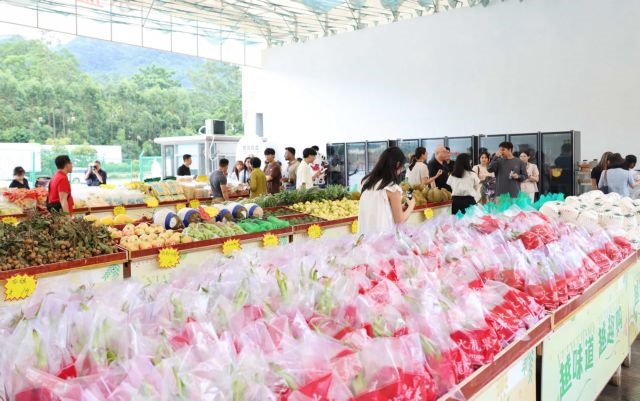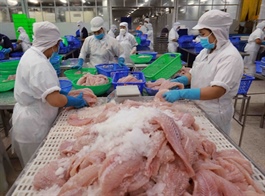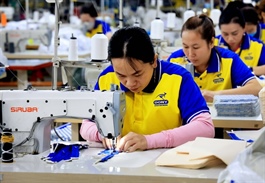Việt Nam’s fruit, vegetable exports exceed $7 billion in 10 months
Việt Nam’s fruit, vegetable exports exceed $7 billion in 10 months
China remains the largest buyer, accounting for 62.9 per cent of the total fruit and vegetable exports value, followed by the US with 6.6 per cent and the Republic of Korea with 3.9 per cent.

Vietnamese fruits on shelves at Hữu Nghị Border Gate. Việt Nam’s fruit and vegetable exports were estimated at over US$7 billion in the first 10 months of 2025, up 14 per cent year on year. — VNA/VNS Photo Quang Hưng |
Việt Nam’s fruit and vegetable exports reached over US$7.09 billion in the first 10 months of 2025, up 15.1 per cent year on year, according to the latest updates of the Ministry of Agriculture and Environment.
This robust export creates a firm ground for the industry to reach a record value of $8.5 billion for the full year and $10 billion in the near future as the country enhances quality, expands markets and adapts to new import regulations, particularly from China.
China remains the largest buyer, accounting for 62.9 per cent of the total fruit and vegetable exports value, followed by the US with 6.6 per cent and the Republic of Korea with 3.9 per cent.
Exports to Malaysia saw the highest increasing rate of 70.2 per cent while Thailand saw the largest drop of 55.6 per cent.
According to the Vietnam Fruit and Vegetable Association (Vinafruit), the sector’s growth has been driven by strategic fruits such as durian, banana, mango, jackfruit, coconut and pomelo.
Thanks to the strong recovery of durian exports, total fruit and vegetable shipments had risen sharply, said Vinafruit Secretary-General Đặng Phúc Nguyên, adding that durian exports alone may exceed $3 billion this year.
Vietnamese fruits were increasingly entering high-end markets. Durian exports had recorded double-digit growth in destinations such as the US, Canada and Japan. Most notably, Vietnamese pomelos were recently approved for import into Australia - a breakthrough demonstrating Việt Nam’s ability to meet stringent food safety standards.
“The entry into Australia marks an important milestone and could open doors to other demanding markets,” Nguyên said, adding that exporters also hope to soon ship pomelos to China, where demand is strong.
Nguyên said export turnover had consistently exceeded $900 million per month since August, reflecting surging demand in major import markets.
“If this momentum continues in the remaining months of this year, fruit and vegetable exports could reach $8.5 billion in 2025,” he said.
“This achievement will not only mark a milestone in export value but also reaffirm Việt Nam’s position on the global fruit and vegetable map - moving toward sustainable growth and a stronger national agricultural brand.”
However, sustaining growth requires stricter quality control.
Nguyễn Phong Phú, Technical Director of Vina T&T Group, warned that some farming areas still used outdated methods and non-compliant pesticides, posing contamination risks. He noted that importing countries strictly monitored pesticide residues, so even a slight excess could lead to shipment rejection, damaging the industry’s reputation.
Developing standardised raw material zones is seen as crucial for sustainable growth.
Nguyên said the national pilot scheme for certified production zones during the 2022–25 period was a timely initiative.
To enter markets like Australia, the US, the EU or the Republic of Korea, consistency and traceability were essential, he emphasised, noting that farming zones must be properly planned, use the right varieties and comply with VietGAP and GlobalGAP standards.
Still, small-scale production and limited infrastructure remained bottlenecks.
“Each importing country has different regulations. Without proper training, even minor errors can cause entire shipments to be rejected,” Nguyên warned.
Amid these challenges, China’s new Decree No 280, which will take effect on June 1, 2026, replacing Decree 248, marks a significant regulatory shift.
According to Ngô Xuân Nam, Deputy Director of the Vietnam Sanitary and Phytosanitary Notification Authority and Enquiry Point (SPS Vietnam), the decree introduces a risk-based management approach, classifying products and exporters by risk level and aligning regulations with international practices.
He advised Vietnamese companies to review their registration on China’s Import Food Enterprise Registration (CIFER) system, as major changes in legal status or operations could result in immediate cancellation of registration codes.
Before the new rules take effect, businesses are urged to raise production standards, enhance traceability and improve risk management, with strict compliance in planting and packing facility codes remaining essential.
- 14:26 10/11/2025























